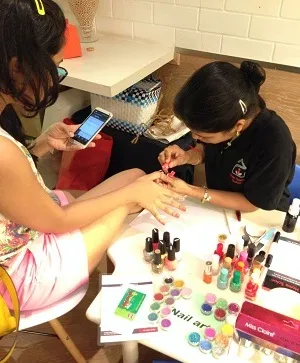How this investment banker promises to make you feel beautiful? The Home Salon story

Long working hours in investment banking gave Rishika Chandan very little time for personal grooming. Salon visits were often restricted to weekends, and this took away her leisure and family time after a hectic week. Most urban women can relate to this situation.“It got worse when I got married and moved to a large complex where salons were not easily accessible for urgent and immediate requirements. That’s when this simple idea occurred to me — when all else can be delivered, why not beauty services? When we have food, groceries, cabs, even furniture delivered to our doorsteps, why can’t we have hygienic, professional and trained therapists deliver beauty treatments at home? So I decided to start a venture that seeks to organize this otherwise highly unorganized ‘parlour wali’ segment with my startup, The Home Salon,” says Rishika.
In a freewheeling chat with YourStory, Rishika shares details of her journey and hopes that the risk she took by giving up her investment-banking career pays off.
YourStory: How are you differentiating your business in the market? How do you plan to scale?
RC: Our model is unique in its concept itself. We offer home services that physical salons today do not provide. We offer professional therapists who are trained at reputed institutes or through our trainers. They maintain high standards of hygiene in comparison to local ladies who provide freelance services. Clients prefer salons because it gives them a sense of relaxation, which a home service, in their view, does not. We have a simple philosophy — we replicate the salon in your home. Whether this means providing the client with a beverage of her choice (we currently offer four options; tea, coffee, green tea and Tang) or carrying spa/aroma candles to every service, we ensure the client feels relaxed and enjoys the treatment. We carry all our disposables and equipment with us, including client aprons and water heaters, and as a rule, do not interrupt the client once they are seated for the service. We also plan to add spa music to our bag soon.

In addition to individual services, we also do SPAmper parties for women — to give them some time out. Having spa corners in kitty parties, bridal showers, baby showers or just a party at home are some of the things we do. This has been hugely successful for us too.
This model is desired by a variety of women today — from new mothers with toddlers at home, to career women with long working hours or homemakers who do not have the time to step out to a salon. Hence it is a scalable business in its foundation. We intend to open small hub offices across different parts of Mumbai to cater to the nearby radius — since this is a small catchment area business. We are currently evaluating two more locations, in addition to our one office in Andheri East. At the moment, however, we cater to all parts of the city subject to minimum billing requirements.
YS: What according to you is your competitive advantage? How do you ensure standardization in your business?
RC: At the moment we have the first mover advantage; there is no single business of such a scale in this area so far. In addition to that, we only hire therapists who come with a longstanding working experience — a minimum of three to five years, preferably having done home service. This ensures they understand their work well enough. We ensure standardization through training sessions which are defined into clear modules covering everything from greeting a customer, to service delivery to even collecting the invoice amounts. We strongly believe in creating a robust foundation, as newcomers will learn from the existing therapists. Therefore, we will invest a chunk of our revenues in training and etiquette. We also have systems, processes and SOPs in place for everything. From packing of the service bags to checking personal appearance, the therapist has all checks and balances in place that need to be blindly followed to ensure consistency in service. Having these in place at an early stage is, in my experience, most vital for a business to ensure smooth scaling up. We are going slow but steady since we want to make sure our launch pad is strong enough to take on future expansions.

YS: What keeps you excited about your work? And how do you deal with stress at work? RC: What I like most is that every day is a new day; I do not know what the day has in store for me. The high is when a customer applauds your service and tells you how your concept is wonderfully innovative and serves their needs perfectly. I read customer feedbacks several times a day since it makes me realize I am on the right track. Starting up is no easy thing. I have done everything from purchasing inventory to interviewing therapists and driving them myself to client locations when our drivers have been on leave, or waiting for them to finish their service in the car. Appreciative feedback really makes my day! I think our biggest challenge today is marketing. Given that this is a complete online model with no brick & mortar presence, making people aware of us in a cost-effective manner is difficult. Social media is good for people who are constantly online, but a chunk of our target audience - mothers, housewives or women who are in office for long hours and do not access facebook regularly - may miss us. Pamphlets are effective yet expensive. While we do a little of all of these, our biggest marketing medium is through word-of-mouth, which is slow but is showing good results. Another challenge is operations. But that, as I mentioned, is being addressed through systems & processes that we are constantly putting in place.
YS: Tell us about your team? Have you raised capital?
RC: We are a three-month-old business, so the team right now includes five therapists. The idea in the last three months was to establish a proof of concept, fine-tune the model and then build a team. We are now in the third stage and have hired two graduates and looking to hire one or two MBA candidates to take on specific roles such as marketing, business development and our institutional/events business. We plan to have a team of three to five (excluding our therapists) within the next six months, to take on various roles at the firm. We think this is the next most critical need in order to accomplish our expansion plans. We have not raised capital yet and are relying on funds from personal savings as well as friends and family.

YS: What can we expect from you in the coming months?
RC: In the coming months, The Home Salon should have a professional team in place, which should help streamline operations and marketing. We are also planning on targeting corporates in a big way, and continuing our successful run on innovative ‘pamper parties’ for women. We also plan to launch men’s grooming services — but that is still underway. We believe that will be a big boost for us too. We also intend to hit the market to raise some capital since we will need that to hire our team and set up additional office locations.
YS: Any risk that you took and how did it work out for you?
RC: The biggest risk was leaving a successful investment-banking career to start up on my own, with monthly pocket money from my husband. How that will work out for me is yet to be seen.
The business of beauty
A 2012 Price Waterhouse Coopers/FICCI report said the beauty care market in India is worth between Rs 230-Rs 245 billion and is growing at 20 to 25 percent annually. It’s a space that continues to grow and opportunities lie in abundance. A Euromonitor report indicates similar growth pattern and highlights an interesting fact about this space – a good economy drives more consumption and spending in beauty and grooming - and so does depression. A depression-hit economy creates the need for escapism. So, all in all, beauty care seems a good space to be in.
What is working for The Home Salon at present?
Our view:
1. A strong team
2. Large addressable market
3. Standardization of service







